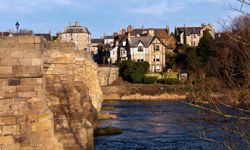Liberty of Hexhamshire
Liberty of Hexhamshire | |
|---|---|
| Kingdom of Northumbria | |
| Capital | Bamburgh (national) Hexham (county) |
| Largest city | Hexham |
| Official languages | English (British English, Northumbrian dialects) |
| Demonym(s) | Hexhamite |
| Government | Liberty in a unitary parliamentary constitutional monarchy |
• King of Northumbria | King of Northumbria |
• Prime Minister of Northumbria | Abbott of Hexham |
• Abbott of Hexham | Chairman of Hexhamshire Council |
| Legislature | Hexhamshire Council |
| Establishment | 24/11/2020 |
| Currency | Pound Sterling |
| Time zone | Northumbrian Standard Time |
Hexhamshire, or more properly the Liberty of Hexhamshire (often abbreviated simply to Hexham) is one of six counties within the Kingdom of Northumbria. It borders the counties of Northumberland to the north, Newcastle to the east and Durham to the south. By population it is Northumbria's smallest county with 59,000 inhabitants (and a population density of 36.3), though by area it is the third largest.
History
Kingdom of Sorrenia
The area now contained within Hexhamshire was first claimed by Northumbria's predecessor - the Kingdom of Sorrenia - during the 'Great Expansion', when the Sorrenian government greatly expanded the territorial claim of Sorrenia to encompass all of the North East, North Yorkshire and much of the North West. At the time however it was part of the county of Northumberland, as it is in the United Kingdom. Hexhamshire acquired a degree of importance at this time as it was a preferred spot for training by the Sorrenian Royal Army, who occasionally camped in the area.
Kingdom of Northumbria
Initially, Northumbrian officials intended to once again include Hexhamshire within the county of Northumberland. Prime Minister Rilgar Ompastre however decided to recreate the medieval county of Hexhamshire which had existed until 1572 when it was incorporated into Northumberland. It was declared a liberty, a traditional English unit wherein regalian right was revoked with powers held by a mesne lord. In keeping with Hexham's traditional role as a seat of the bishop, Hexhamshire's head of state was declared to be the Abbott of Hexham Abbey, which also doubled up as a monastery.
Government
Hexhamshire's head of state is the Abbott of Hexham, an ecclesiastical title within the Northumbrian Church of England. The Abbott is chosen by the monks of Hexham Abbey and ratified by the Prince-Bishop of Durham.
Hexhamshire's legislature is a small county council appropriately called Hexhamshire Council. It consists of just seven members, and is the smallest county council in Northumbria. Members are elected during general elections. The head of the council is ceremonially referred to as the 'Abbott's Elect', though in fact the Abbott has no official say in who heads the council. Though not a member, the Abbott is expected to attend council meetings.
The Abbott of Hexham, as head of state of Hexhamshire, is entitled to appoint two members to the Witan, the upper chamber of Northumbria's legislature. The Abbott of Hexham is one of two officials in Northumbria granted the right to send Lords spiritual to the Witan, though he may only send one. The Abbott himself usually represents Hexhamshire in the Witan.
Political parties
Hexham's politics is completely dominated by the Christian Democrats, a Christian democratic agrarian party. Some of the largest margins of victory in all of Northumbria are won by the Christian Democrats in Hexhamshire. The National Democratic Party tend to come second, while other parties either finish in a distant third or do not run candidates at all.
Hexhamshire's government is also perceived to be a supporter of Durham irredentism, a movement which pushes for a maximalist drawing of Durham's borders to encompass all the land once held by the Bishop of Durham. Though not itself part of County Durham, many inhabitants believe that if Durham was to lose land to Northumberland (like Islandshire and Bedlingtonshire), the county may in turn push to reincorporate Hexhamshire.
Geography

Hexhamshire contains part of the North Pennines, which since 1988 has been designated an Area of Outstanding Natural Beauty (AONB). The landscape is dominated by moorland scenery, itself the product of farming and lead-mining. A number of rivers run through the county - most notably the River Tyne, one of three great rivers in North East England. The two rivers which form the Tyne (the North Tyne and the South Tyne) converge in Hexham itself, named 'The Meeting of the Waters'.
To its south, Hexhamshire also contains part of the picturesque Derwentside region, including Derwent Reservoir and villages such as Blanchland. It is also a 'border county', bordering the English county of Cumbria, with Hexhamshire's most westerly point just 23 km away from the Cumbrian town of Carlisle.
Settlements
Most of Hexhamshire's settlements are located in the Tynedale valley adjacent to the River Tyne. It possesses just one city - Hexham - and one town - Prudhoe; all other settlements are listed as villages.
| Rank | Name | Pop. | Area | Location |
|---|---|---|---|---|
| 1 | Hexham | 11,800 | Tynedale | |
| 2 | Prudhoe | 11,600 | Tynedale | |
| 3 | Corbridge | 3,600 | Tynedale | |
| 4 | Wylam | 2,000 | Tynedale |
Economy
Hexhamshire's distinctive moorland landscape was the result of centuries of farming and mining. Whereas the more easterly parts of the North East were renowned for coal mining (containing the Great Northern Coalfield), the North Pennines were more known for shale and lead mining. Hexhamshire's economy today remains very agrarian, including forestry, sheep farming and grouse shooting.
Many inhabitants in towns like Corbridge, Prudhoe and Bywell commute to the city of Newcastle upon Tyne either via the A69 road or the Tyne Valley Rail Line. These towns and villages also attract sizeable numbers of tourists due to their picturesque scenery. A major employer in Hexham itself is Egger (UK) Limited, a manufacturing company.
Culture
Since becoming its own county, Hexhamshire has acquired a distinct identity and subculture. Alongside Durham and Northumberland, it is famed for its natural geography and pretty towns. And with Durham, it dominates Northumbrian ecclesiastical politics. Hexhamshire's government - perceived as more supportive of Durham irredentism - help to secure a majority in the Witan in favour of Durham irredentism (alongside the Prince-Bishop of Durham's appointees), effectively entrenching the ideology within Northumbria's constitution. Similarly, Hexhamshire is seen as crucial to Northumbria's Anglican identity, given its population's support for the Christian Democrats and Hexham's history as a Bishopric. These factors have in some sense allowed Hexhamshire to 'punch above its weight', and it remains a popular destination for Northumbrian citizens to visit.
Gallery
-
Corbridge

